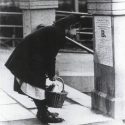Anna Lenah Maria Elgström was the daughter of a civil engineer who belonged to the Free Church. She trained as an artist, but after her highly acclaimed short story collection Gäster och främlinger, 1911, turned to writing. She was married to Gustaf Collijn, the director of the theatre Intima Teatern in Stockholm.
Anna Lenah Maria Elgström introduced expressionism and fear-laden emotional analysis to Swedish prose. In her short story collections such as Fattigfolk, 1912, Mödrar, 1917, Martha och Maria, 1921, and Kvinnor, 1930, she endeavoured to lend a social slant to Ellen Key’s ideas about social motherhood, which often made the stories appear excessively defeatist with their focus on individual suffering.
Her autobiographical trilogy De kloka Elsa, 1928, Elsa och kärleken, 1932, and Elsa i männens värld, 1936, are about a rebellious bourgeois girl growing up at the turn of the century. As well as writing over thirty novels, short story collections, essay collections, and travel books, she also worked as a journalist from 1922 to 1949 on the newspaper Morgontidningen.
After participating in the International Women’s Congress for Peace and Freedom in The Hague in 1915, she became a driving force within the Swedish women’s movement and the peace movement and was also one of the initiators of Save the Children in Sweden. She was chair of the Swedish women’s committee for Spanish children and a member of the refugee aid committee of 1940.
Further Reading
Cheri Register: "Consuming flames / illuminating starlight: feminist pacifist themes in a story by Anna Lenah Elgström" in: Mothers - saviours - peacemakers, 1983


